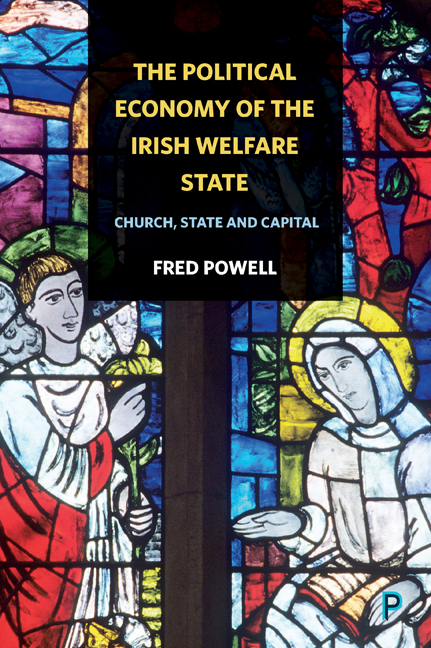Book contents
- Frontmatter
- Dedication
- Contents
- Preface
- Introduction
- one Why the welfare state matters
- two Revolution, culture and society
- three Welfare in the Free State
- four Religious nationalism, sectarianism and anti-semitism
- five The welfare state debate
- six Poverty and social inequality
- seven Liberty, gender and sexuality
- eight The marketisation of the welfare state
- nine Crisis, austerity and water
- ten Conclusion
- References
- Index
Introduction
Published online by Cambridge University Press: 08 April 2022
- Frontmatter
- Dedication
- Contents
- Preface
- Introduction
- one Why the welfare state matters
- two Revolution, culture and society
- three Welfare in the Free State
- four Religious nationalism, sectarianism and anti-semitism
- five The welfare state debate
- six Poverty and social inequality
- seven Liberty, gender and sexuality
- eight The marketisation of the welfare state
- nine Crisis, austerity and water
- ten Conclusion
- References
- Index
Summary
We evolved a half-baked Welfare State, a chaotic and enormously inefficient mix of public, private and charitable provision. And many parts of the political and bureaucratic systems are happy with this. The difference between having rights and receiving charity is accountability. Charity is unaccountable – it speaks to the goodness of the heart not the good of the citizens. And having this unaccountability at the core of so much of our system of public provision doesn't just suit the church – it suits all those whose lives are made easier by not having to answer to the people they supposedly serve.
Fintan O’Toole, Irish Times, 25 April 2017Two Nobel laureates during the centenary year of the epic event of the Irish Revolution – the 1916 Rising – have been highly critical of the Irish state. Paul Krugman has mocked Irish growth statistics as ‘leprechaun economics’ (2016a), meaning trickster economics. More ominously, Joseph Stiglitz has called Irish taxation policy ‘corrupt’ and accused Ireland of ‘robbing developing countries’ and the United States, which sounds like a warning to a rogue state (The Irish Times, 31 August 2016). Ireland, according to The Irish Times (1 October 2016), is sometimes regarded as beyond the European Pale because it lacks its ‘enlightened’ core values: post-nationalism, advanced secularism, scepticism about market values, low tolerance of violence and a strong belief in the ethos of the welfare state. Are these profoundly negative characterisations of Ireland justified? Or is Ireland, as represented by the UN Human Development Index 2015, one of the best countries in the world in terms of quality of life? Carmen Kuhling and Kieran Keohane (2007: 206-7) observe:
… quality of life is an elusive and paradoxical thing … Despite the fact that Ireland has been lauded for having a high quality of life, it seems clear by the evidence that although substantial gains have been made in Irish society through pursuing neoliberal economic policy, this economic modernisation has been accompanied by a variety of social inequalities and by a strong decline in social cohesion.
Arguably, Ireland's failure to move beyond a historic residual welfare state model, within what is essentially a competition state, has had very serious social policy consequences in terms of the well-being and social equality of the Irish population.
- Type
- Chapter
- Information
- The Political Economy of the Irish Welfare StateChurch, State and Capital, pp. 1 - 12Publisher: Bristol University PressPrint publication year: 2017



